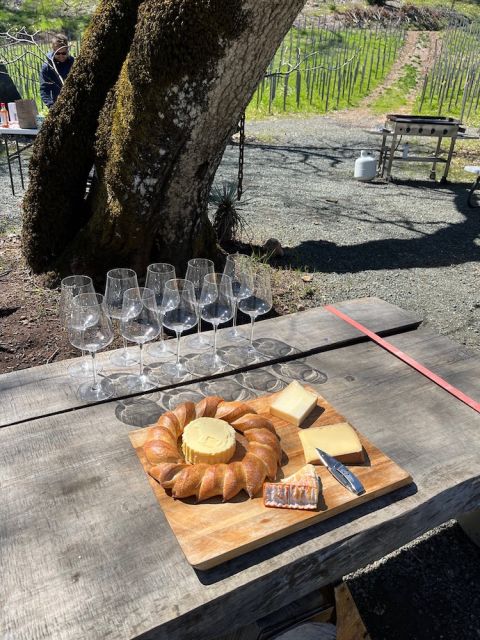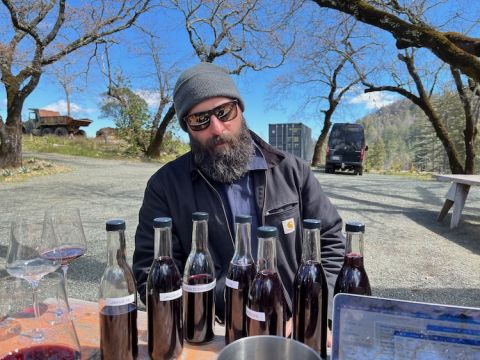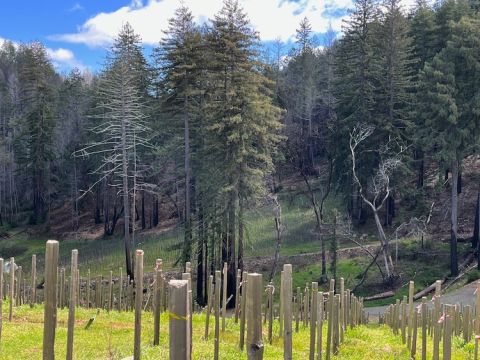‘The buildings all burned in the fire so all we have is a Porta Potty for facilities fyi. Tasting and lunch will be outside under some oak trees … should be a lovely day.’
This was the last of three emails sent by Ketan Mody before I visited his new, very new, vineyard Jasud Estate, high above Napa Valley on Diamond Mountain, last April. The previous one contained directions that gave no idea of quite how treacherous the road to 2087 Diamond Mountain Road is. The series of hairpin bends on the way up to the famous Ridge Vineyards above Silicon Valley is like a freeway compared with the steep, rough, single-width track through charred forest that we had to navigate. The directions weren’t perfect and on reaching the vineyard we ended up having to do a U-turn on a six-foot-wide path next to what looked like a precipice. I have a nasty feeling we may have run over a vine – which is a shame because Mody doesn’t have that many of them and every one was planted personally by him or by one or two close friends.
He is nothing if not committed to this barely accessible site on the side of a mountain and readily admits that he and his father were able to buy it because ‘property was cheap in 2008’. It took more than four years to get a permit to clear this rocky terrain of forest, scrub and some old walnut trees, a process that took a further three or four years. ‘This permit you can’t even get any more’, he growled delightedly between puffs of the cigarette that’s never far from his lips. ‘You’re not allowed to plant on a slope that’s more than 30% now. We’d probably be allowed to plant only about a third of the vines we’ve got today. The cost of a planting permit is the same whether it’s for two or 100 acres so generally only the big companies can afford to get one.’
But Mody is supremely determined. Born in Georgia to a father from Ahmedabad in India and a Mississippi mother, he was raised Florida and initially went to art school. ‘But I got disillusioned by painting and so built wooden boats for a while. I had Lyme disease really badly but didn’t know it even though I was having seizures.’ He was finally diagnosed and was bedridden for a year but during his recovery (let’s hope no more seizures on Diamond Mountain Road) he worked with his brother in finance and was able to sell his share of the business before the financial crisis of 2008 hit, ‘so I had a coupla dollars’. (He has also been smart enough to start a vineyard-development company that rents out heavy machinery, which must help tide him over while waiting for Jasud Estate to turn a profit.)
There was obviously some family drama as ‘my dad and I hadn’t talked in six or seven years, but on reconnection we found we were both into wine’. Mody went to New Zealand in 2007 to work for Vavasour, moved to Napa Valley on his return and sent out his résumé to 30 wineries. Only the leader of the pack, Harlan Estate, responded, with the result that Mody ended up working for Harlan’s talented winemaker Cory Empting while waiting for permission to get going up on Diamond Mountain. He describes his time with Empting as ‘an incredible opportunity to learn so much and how to work so cleanly – it was a life-changing experience for me’.
And it was apparently a friend of Bill Harlan’s who pointed out that this rocky site on fractured basalt at 1,650–2,000 feet (500–610 m), 80% north-facing so much cooler than most Napa Valley vineyards, might be available. During our visit I had clear evidence of how much cooler Jasud is than the valley floor. I needed two jackets, and the pat of butter artfully embossed with the shape of a cow, bought for our lunch by Mody’s chef friend Curtis Di Fede, showed not a sign of melting even though it was laid out in full sunlight on the rough table. Beneath the bare oaks the sumptuously bearded, loquacious Mody combined sunglasses with a thick Carhartt jacket and a beanie.
The property had been a summer escape for a family from the Bay Area and when Mody bought it there was nothing but a little cabin and a whole load of rocks. The back-breaking work clearing the 60-acre (24-ha) site finally started in 2013 and two blocks of the 15-acre (6-ha) vineyard went into the ground in 2016. Because vines need at least three years to settle in, it was not until 2019 that any grapes were harvested, resulting in a whole two barrels of wine. But then disaster struck: Napa Valley’s notorious fires in summer 2020. ‘Everything burnt’, Mody told me as Di Fede cautiously fired up the barbecue. ‘We were firefighting at another property. A wall of fire crept back over the hill. Our building literally burst and we lost about 40% of the vines we’d planted.’
No wine at all was made in 2020 but the vineyard, exceptional in Napa Valley in being unirrigated and densely planted, each vine with its own thick wooden post, has now been painstakingly replanted. About 2.5 acres (1 ha) of the vines are, unusually, on their own roots rather than being grafted on rootstocks resistant to the predatory aphid-like insect phylloxera.
In 2022 they harvested just five tons of grapes, so a tiny average yield, and have managed to make some wine specifically from the ungrafted vines. ‘They’re very rare in Napa. Even if we got to make that wine only four or five times and then got phylloxera, it would be worth it because the wines are so different in every sense.’
All the Cabernet Sauvignon plants, I was told, are based on cuttings from Napa Valley’s top vineyards such as the MacDonald brothers’, Eisele, Spottswoode, Diamond Creek, Martha’s and so on. When I asked whether he had permission to take the budwood Mody replied rather shockingly, ‘Some gave me permission … the ones that said no I went and took anyway.’
But Mody freely told me that his small plot of Grenache is based on budwood that he took from Château Rayas’s famous vineyard in Châteauneuf-du-Pape. The owner, his hero Emmanuel Reynaud, was not amused.
As we munched our beautifully seasoned beef he pointed out a few baby vines. ‘That is basically our nursery. From there we select and then plant on rootstocks. I want to be able to sleep at night confident of what I have in the ground rather than buy vines from a commercial nursery.’
Does your father think you’re crazy?, I couldn’t help asking. ‘Yes, but he’s crazy too’, Mody smiled. ‘He’s still based in Florida and visits three or four times a year. He has an immigrant mentality: if you’re gonna do something, go all the way. Sure, there are easier ways to make money but I really feel I’m blessed to be able to do this. I’ve never worked harder for less money but I’ve never been happier. After 2019 [when the first wine was made] I knew this vineyard had a voice.’
Jasud is named after his father’s ‘very strong’ mother and for some years he has also been making a range of deliberately primitively labelled wines called Beta (which means child in Hindi) from bought-in grapes. They’re sold, Napa style, via a mailing list and, he told me, sell out in 24 hours. ‘I sell five cases to New York and they end up in top restaurants.’ I learned on my return to the UK that Justerini & Brooks plan to offer Beta 2019s and Jasud 2021 this autumn.
Up in the mountain air I had a chance to taste nine Beta wines and seven embryonic Jasud wines made from the vines that surrounded us. They are indeed very distinctive, almost wild, and the Jasud wines rarely have more than 13% alcohol, much less than the northern California norm. Made ‘at a friend’s in Sonoma; it’s really hard to find a place where you can do your own thing’, they’re all aged in unusually large casks of at least 500 litres. ‘I’m trying to slow everything down’, he explained.
Fifteen or sixteen years from acquisition to sellable liquid is certainly pretty slow.
The only Mody wine in commercial circulation so far …
… seems to be
Beta, Montecillo Vineyard Cabernet Sauvignon 2018 Moon Mountain District 14.2%
From $199 from various US retailers
Tasting notes for Jasud and Beta wines in our tasting notes database; US stockists on Wine-Searcher.com.

















